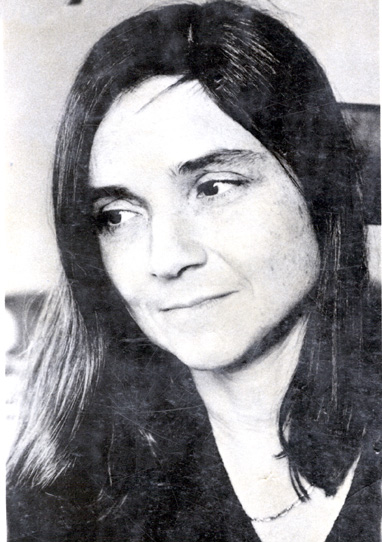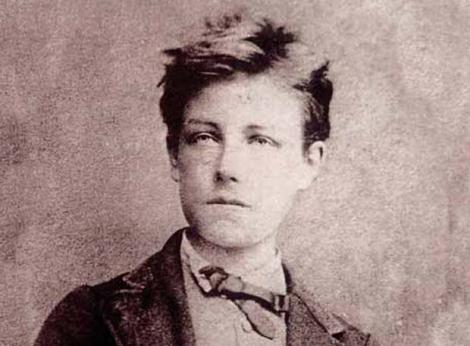Venus
Anadyomene
As
from a green zinc coffin, a woman’s
Head
with brown hair heavily pomaded
Emerges
slowly and stupidly from an old bathtub,
With
bald patches rather badly hidden;
Then
the fat gray neck, broad shoulder-blades
Sticking
out; a short back which curves in and bulges,
Then
the roundness of the buttocks seems to take off;
The
fat under the skin appears in slabs:
The
spine is a bit red; and the whole thing has a smell
Strangely
horrible; you notice especially
Odd
details you’d have to see with a magnifying glass . . .
The
buttocks bear two engraved words: CLARA VENUS;
— And
that whole body moves and extends its broad rump
Hideously
beautiful with an ulcer on the anus.
from
Novel
Night
in June! Seventeen years old! — We are overcome by it all.
The
sap is champagne and goes to our head . . .
We
talked a lot and feel a kiss on our lips
Trembling
there like a small insect . . .
III
Our
wild heart moves through novels like Robinsoe Crusoe,
— When,
in the light of a pale street lamp,
A
girl goes by attractive and charming
Under
the shadow of her father’s terrible collar . . .
A
Dream for Winter
To
††† Her
In
the winter, we will leave in a small pink railway carriage
With
blue cushions.
We
will be comfortable. A nest of mad kisses lies
In
each soft corner.
You
will close your eyes, in order not to see, through the glass,
The
evening shadows making faces,
Those
snarling monstrosities, a populace
Of
black demons and black wolves.
Then
you will feel your cheek scratched . . .
A
little kiss, like a mad spider,
Will
run around your neck . . .
And
you will say to me: “Get it!”, as you bend your neck;
— And
we will take a long time to find that creature
—
Which travels a great deal . . .
Seven-year-old
Poets
And
the Mother, closing the exercise book,
Went
off satisfied and very proud, without seeing,
In
the blue eyes and under his brow covered with bumps
The
soul of her child given over to repugnance.
All
day he sweated obedience; very
Intelligent;
yet dark twitchings, a few traits,
Seemed
to testify in him to bitter hypocrisy.
In
the shadow of the corridors with their moldy hangings,
Passing
through he stuck out his tongue, his two fists
In
his groin, and in his closed eyes saw spots.
A
door opened on to evening: by the lamp
You
saw him up there moaning on the stairway,
Under
a flood of daylight falling from the roof. In summer
Especially,
overcome, stupefied he was bent
On
shutting himself up in the coolness of the outhouse:
There
he meditated, peacefully, opening his nostrils.
When
washed from the day’s odors, the small garden
Behind
the house, in winter, lit up with the moon,
As
he lay at the foot of a wall, buried in clay,
And
rubbed his dizzy eyes to bring about visions,
He
listened to the mangy espaliers as they seemed to swarm.
Pity!
only those children were his friends
Who,
sickly, bare-headed, with eyes weeping on their cheeks,
Hiding
thin fingers yellow and black with mud
Under
worn-out clothes stinking of diarrhea and old,
Talked
with the gentleness of idiots!
And
if she caught him in actions of filthy pity,
His
mother was horrified. The deep tenderness
Of
the child forced itself on her surprise.
That
was appropriate. She had the blue glance, — that lies!
At
seven, he wrote novels about life
In
the great desert, where exiled Freedom shines,
Forests,
suns, rios, plains! — He was helped
With
illustrated newspapers where, blushing, he saw
Spanish
and Italian girls laugh.
When
the daughter of the workers next door came,
— Eight
years old, — brown eyes, wild, in a calico dress,
The
little brute, and when in a corner,
She
had jumped on his back, shaking her long hair,
And
he was under her, he bit her buttocks,
For
she never wore panties;
— And,
bruised by her fists and heels,
Took
back the taste of her flesh to his room.
He
feared the grey December Sundays,
When,
his hair greased, on a mahogany stool,
He
read a Bible with cabbage-green edges.
Dreams
oppressed him every night in his small room.
He
did not love God; but the men whom, in the brown evening,
Swarthy,
in jackets, he saw going home to their quarters,
Where
town criers, with three drum rolls
Make
the crowds laugh and roar over edicts.
— He
dreamed of an amorous pasture, where shining
Swells,
natural perfumes, golden puberties
Move
calmly and take flight!
And
as he especially savored dark things,
When,
in his bare room with closed shutters,
High
and blue, sourly covered with humidity,
He
read his ceaselessly meditated novel,
Full
of heavy ocherous skies and soaked forests,
Of
fresh flowers opened in the astral woods,
Dizziness,
crumblings, routs and pity!
— While
the noise of the neighborhood went on
Down
below — alone, and lying on pieces of unbleached
Canvas,
and violently announcing a sail!
The
Hands of Jeanne-Marie
Jeanne-Marie
has strong hands,
Dark
hands the summer tanned,
Hands
pale like dead hands.
— Are
they the hands of Juana?
Did
they get their dark cream color
On
pools of voluptuousness?
Have
they dipped into moons
In
ponds of serenity?
Have
they drunk from barbaric skies,
Calm
on charming knees?
Have
they rolled cigars
Or
traded in diamonds?
On
the burning feet of Madonnas
Have
they tossed golden flowers?
It
is the black blood of belladonnas
That
bursts and sleeps in their palms.
Are
they hands driving the diptera
With
which the blueness of dawn
Buzzes,
toward the nectars?
Hands
decanting poisons?
Oh!
what Dream has held them
In
pandiculations?
An
extraordinary dream of Asias,
Of
Khenghavars or Zions?
— These
hands have not sold oranges,
Nor
turned brown at the feet of the gods;
These
hands have not washed the diapers
Of
heavy babies without eyes.
(They
are not hands of a cousin
Or
of working women with large foreheads
Burned,
in woods stinking of a factory,
By
a sun drunk on tar)
They
are benders of backbones
Hands
that do no harm
More
fatal than machines,
Stronger
than a horse!
Stirring
like furnaces,
And
shaking off all their tremblings
Their
flesh sings Marseillaises
And
never Eleisons!
(They
would strangle your necks, o evil
Women,
they would crush your hands
Noblewomen,
your infamous hands
Full
of white and carmine
The
beauty of those loving hands
Turns
the heads of ewes!
On
their savory finger-joints
The
great sun places a ruby!)
A
stain of populace
Turns
them brown like a breast of yesterday:
The
back of these Hands are the places
Where
every proud Rebel kissed them!
They
have paled, marvelous,
Under
the great sun full of love
On
the bronze of machine-guns,
Throughout
insurgent Paris!
Ah!
sometimes, o sacred Hands,
At
your wrists, Hands where tremble our
Never
sobered lips,
Cries
out a chain of clear links!
And
it is a strange Tremor
In
our beings, when, at times
They
want to remove your sunburn, Hands of an angel,
By
making your fingers bleed!
Evening
Prayer
I
live seated, like an angel in the hands of a barber,
In
my fist a strongly fluted mug,
My
stomach and neck curved, a Gambier pipe
In
my teeth, under the air swollen with impalpable veils of smoke.
Like
the warm excrement of an old pigeonhouse,
A
Thousand Dreams gently burn inside me:
And
at moments my sad heart is like sap-wood
Which
the young dark gold of its sweating covers with blood.
Then,
when I have carefully swallowed my dreams,
I
turn, having drunk thirty or forty mugs,
And
collect myself, to relieve the bitter need:
Sweetly
as the Lord of the cedar and of hyssops,
I
piss toward the dark skies very high and very far,
With
the consent of the large heliotropes.


.jpg)

